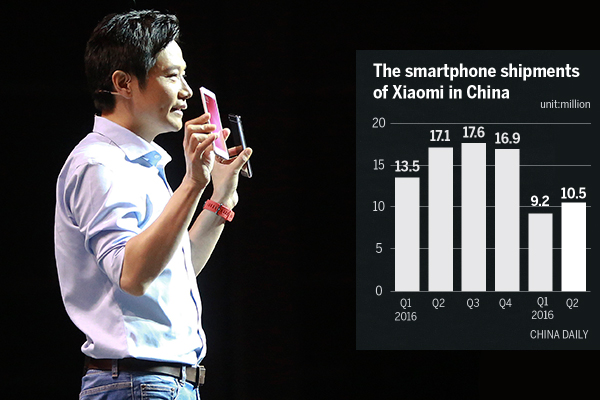Xiaomi unveils fingerprint ID tech
By Ma Si (China Daily) Updated: 2016-09-28 07:11
 |
|
Lei Jun, founder and CEO of Xiaomi, at the release of the company's smartphone series on Tuesday in Beijing. [Photo/China Daily] |
Xiaomi Corp unveiled a flagship smartphone series on Tuesday featuring advanced fingerprint identification technology, marking the first rival product by Chinese firms to compete with Apple Inc after the launch of its latest iPhone.
The Mi 5s, starting at 1,999 yuan ($299), is also the firm's latest effort to boost sales amid slowing demand and rising competition from local rivals such as Huawei Technologies Co Ltd.
The gadget supports ultrasonic fingerprint identification, which delivers greater accuracy than current models by using 10,000 micro sensors, the company said.
Lei Jun, founder and CEO of Xiaomi, said the firm had spent two years experimenting with the technology, and it is designed to ease concerns that frequent touching will wear out the physical identification buttons.
"Applying the technology in a model that can be mass produced showcases our innovation capabilities," Lei said.
The Beijing-based company also joined hands with Sony Corp to offer better cameras on its device. Mi 5s Plus, the bigger-screen version, is equipped with 13-million-pixel dual cameras from Sony and starts from 2,299 yuan.
Jin Di, research manager at International Data Corp China, said the experiment with supersonic fingerprint identification shows that Xiaomi is working hard to differentiate its products from its rivals. "That is not necessarily a big selling point but it will appeal to young people who are eager to try out new technology," Jin said.
Xiaomi's partnership with Sony came after Huawei teamed up with Leica to offer dual cameras on P9, its popular flagship product unveiled in the spring. The iPhone 7 Plus, launched by Apple earlier this month also comes with two cameras on its rear.
"The completive price coupled with new function will deliver a good sales performance for Mi 5S, if there is not a shortage of components in the supply chain, which its previous model the Mi 5 once encountered earlier this year," she added.
In the second quarter of this year, Xiaomi, which once managed a meteoric rise through web-sales-only model, failed to make its way into the top five vendors in China, while its rivals such as Huawei, oppo and vivo leapt forward in terms of shipments, data from IDC show.
- Xiaomi records three million orders for new smartphone series
- China imposes anti-subsidy duties on US distiller's grain
- Real life 'Transformer' car turns into robot
- China's ultra-rich lead global wealth growth
- China's foreign service trade deficit widens
- China extends currency swap deal with EU
- China considers opening airports to private investment
- China September inflation forecast at 1.6%


















